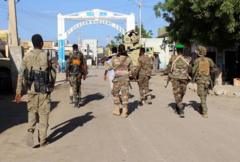Israeli Defense Minister Israel Katz has stated that troops will remain in newly established "security zones" in Gaza even after hostilities cease, citing the need for a buffer against Hamas. The ongoing blockade of humanitarian aid continues as airstrikes kill more Palestinians, worsening a dire humanitarian crisis.
Israeli Defense Minister Confirms Troops Will Stay in Gaza Security Zones

Israeli Defense Minister Confirms Troops Will Stay in Gaza Security Zones
Israel's plan to maintain military presence in Gaza post-war raises humanitarian concerns
Israeli troops will remain in Gaza 'security zones' after war, minister says
Israel's defense minister has announced that the military will retain a presence in specific areas of Gaza even after the end of hostilities. Minister Israel Katz described these "security zones" as essential to protect Israeli communities from potential threats, asserting that significant territory has been occupied during the recent military offensive.
Despite rising civilian casualties, including at least 24 reported deaths from airstrikes on Wednesday alone, Katz indicated that the six-week blockade on humanitarian aid would persist. He maintained that this strategy aims to exert pressure on Hamas for the sake of hostage negotiations. Reports indicate that an estimated 1,650 fatalities have occurred since March 18, with hospitals in Gaza facing dire conditions as they struggle to provide care amid relentless airstrikes.
The UN has declared that nearly 69% of Gaza is under evacuation orders, emphasizing the scale of displacement affecting around 500,000 Palestinians. The humanitarian situation has reached catastrophic levels, according to multiple organizations, with critical shortages of essential supplies and medical resources severely hindering aid efforts.
Amidst these escalating tensions, the Israel Defense Forces continue operations aimed at dismantling Hamas infrastructure, enacting new military strategies in the region. Katz affirmed that Israel's approach will involve not returning control of cleared territories, thereby marking a shift towards a more sustained military footprint reminiscent of previous conflicts in Lebanon and Syria.
While the Israeli government insists there is no shortage of aid, UN agencies have disputed this claim, warning of potential breaches of international humanitarian law. The blockade remains a focal point of humanitarian agencies, which stress that the current situation is possibly the worst crisis Gaza has encountered since October 2023.
Calls for ceasefire negotiations persist, but Hamas has reportedly rejected proposals that involve hostages' release in exchange for any cessation of hostilities. With tensions peaking, the plight of the civilians remains critical, and organizations like Médecins Sans Frontières have condemned the violence, highlighting the significant loss of both Palestinian lives and emergency responders. The enduring uncertainty surrounding future peace remains bleak as Israeli military operations continue unabated within the densely populated territory.
Israel's defense minister has announced that the military will retain a presence in specific areas of Gaza even after the end of hostilities. Minister Israel Katz described these "security zones" as essential to protect Israeli communities from potential threats, asserting that significant territory has been occupied during the recent military offensive.
Despite rising civilian casualties, including at least 24 reported deaths from airstrikes on Wednesday alone, Katz indicated that the six-week blockade on humanitarian aid would persist. He maintained that this strategy aims to exert pressure on Hamas for the sake of hostage negotiations. Reports indicate that an estimated 1,650 fatalities have occurred since March 18, with hospitals in Gaza facing dire conditions as they struggle to provide care amid relentless airstrikes.
The UN has declared that nearly 69% of Gaza is under evacuation orders, emphasizing the scale of displacement affecting around 500,000 Palestinians. The humanitarian situation has reached catastrophic levels, according to multiple organizations, with critical shortages of essential supplies and medical resources severely hindering aid efforts.
Amidst these escalating tensions, the Israel Defense Forces continue operations aimed at dismantling Hamas infrastructure, enacting new military strategies in the region. Katz affirmed that Israel's approach will involve not returning control of cleared territories, thereby marking a shift towards a more sustained military footprint reminiscent of previous conflicts in Lebanon and Syria.
While the Israeli government insists there is no shortage of aid, UN agencies have disputed this claim, warning of potential breaches of international humanitarian law. The blockade remains a focal point of humanitarian agencies, which stress that the current situation is possibly the worst crisis Gaza has encountered since October 2023.
Calls for ceasefire negotiations persist, but Hamas has reportedly rejected proposals that involve hostages' release in exchange for any cessation of hostilities. With tensions peaking, the plight of the civilians remains critical, and organizations like Médecins Sans Frontières have condemned the violence, highlighting the significant loss of both Palestinian lives and emergency responders. The enduring uncertainty surrounding future peace remains bleak as Israeli military operations continue unabated within the densely populated territory.



















